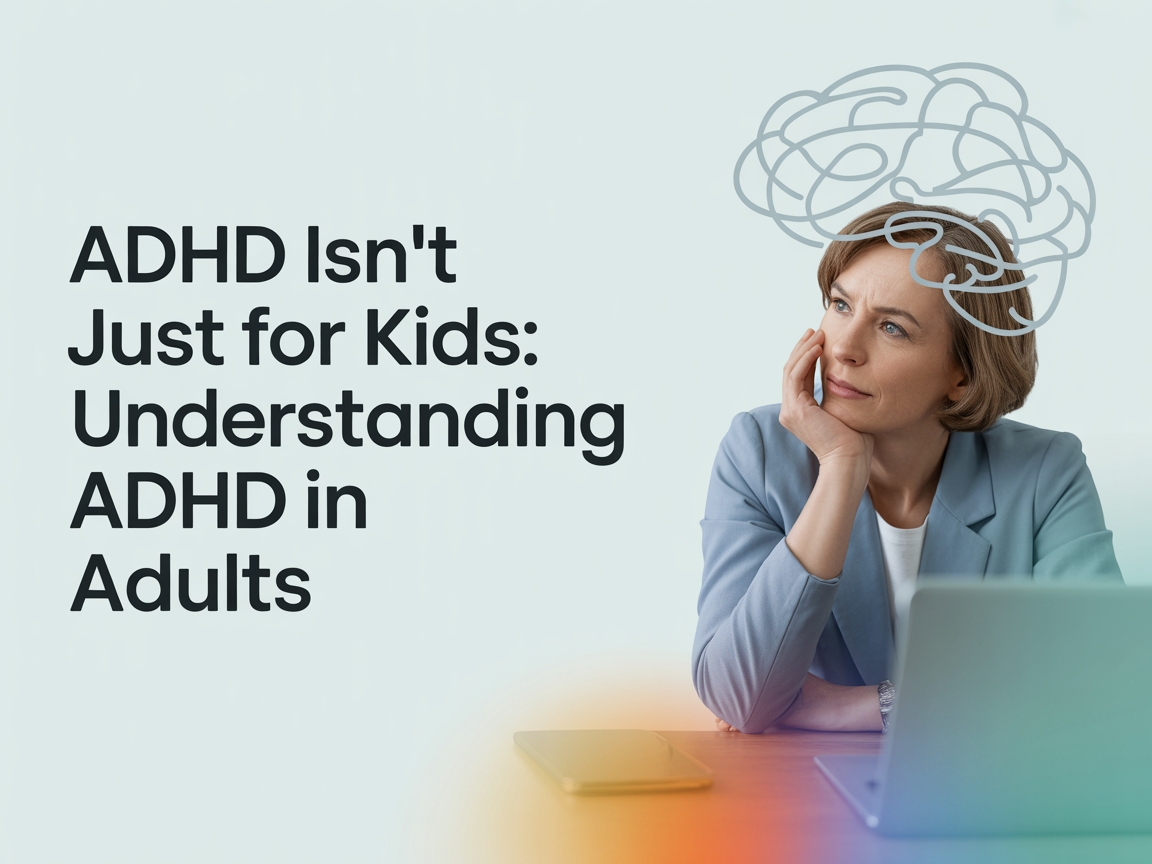
ADHD Isn’t Just for Kids: Understanding ADHD in Adults
When most people think about ADHD, they picture a hyperactive child bouncing off the walls, struggling to sit still in class. But ADHD is not just a childhood condition. In fact, for many people, it doesn’t disappear with age—it just changes shape.
If you’re an adult who’s always felt “scattered,” “disorganized,” or like your brain never stops, you’re not alone. Millions of adults live with ADHD, often without even knowing it. Understanding how ADHD shows up in adulthood is the first step toward managing it and living life on your terms.
How ADHD Looks Different in Adults
ADHD in children often shows up as constant movement, interrupting teachers, or difficulty following classroom rules. But as you grow up, hyperactivity doesn’t always look like running around. Instead, it often turns inward.
In adults, ADHD symptoms can include:
- Restlessness: Feeling like you can’t relax, even when you want to.
- Chronic disorganization: Struggling to keep track of deadlines, bills, or belongings.
- Procrastination & poor time management: Waiting until the last minute to get things done—sometimes thriving on urgency but paying the price later.
- Emotional sensitivity: Overreacting to small frustrations or criticism.
- Relationship struggles: Difficulty keeping up with commitments or managing conflicts.
Instead of “hyperactivity,” many adults describe mental hyperactivity—a racing mind, endless thoughts, and difficulty shutting down at night.
The Hidden Struggles of Adult ADHD
ADHD isn’t just about forgetting appointments or misplacing your keys. It affects every area of life:
- Work: You may be capable and intelligent but still struggle with finishing projects or meeting expectations.
- Relationships: Missed plans, impulsive decisions, or emotional outbursts can strain connections with family and friends.
- Self-esteem: Many adults with undiagnosed ADHD grow up being called “lazy,” “irresponsible,” or “scatterbrained.” Over time, this can damage confidence and mental health.
This is why so many adults with ADHD also experience anxiety, depression, or burnout—not because they are weak, but because they’ve been working twice as hard to keep up without the right support.
Why ADHD Often Gets Missed in Adults
ADHD in adults often flies under the radar. Here’s why:
- Symptoms are more subtle. Hyperactivity may be replaced by restlessness or feeling “on edge.”
- Coping skills mask the signs. Many adults develop workarounds—using planners, relying on adrenaline, or over-scheduling themselves.
- Stigma and stereotypes. Too many people believe ADHD is just for kids—or that adults with it are simply “unmotivated.”
As a result, many adults don’t get diagnosed until their 20s, 30s, or even later—often when career demands, parenting responsibilities, or life changes push their coping mechanisms past the breaking point.
Getting Help as an Adult
If these signs sound familiar, the good news is that help is available—and it works. A proper evaluation by a psychiatrist, psychologist, or qualified provider can confirm whether ADHD is the cause of your struggles.
Treatment for adults often includes:
- Medication: Stimulants or non-stimulants can dramatically improve focus and emotional regulation.
- Therapy or coaching: Cognitive-behavioral therapy (CBT) and ADHD coaching teach strategies for organization, time management, and emotional control.
- Lifestyle adjustments: Exercise, sleep hygiene, mindfulness, and structured routines can help calm a restless mind.
Treatment is not about “fixing” you—it’s about helping you unlock your potential.
You’re Not Alone
Living with ADHD as an adult can feel isolating, but millions of people share your experience. With the right diagnosis and tools, you can transform the way you work, connect, and live.
If you’ve spent years wondering why things feel harder for you than they do for others, it may be time to ask: Could it be ADHD?
Recognizing the signs in yourself is the first step toward taking back control—and building a life that works for you.
Key Takeaway:
ADHD doesn’t end when childhood does. In adults, it often looks like restlessness, emotional ups and downs, and chronic struggles with focus and organization. The right treatment can help you thrive—not just survive.
